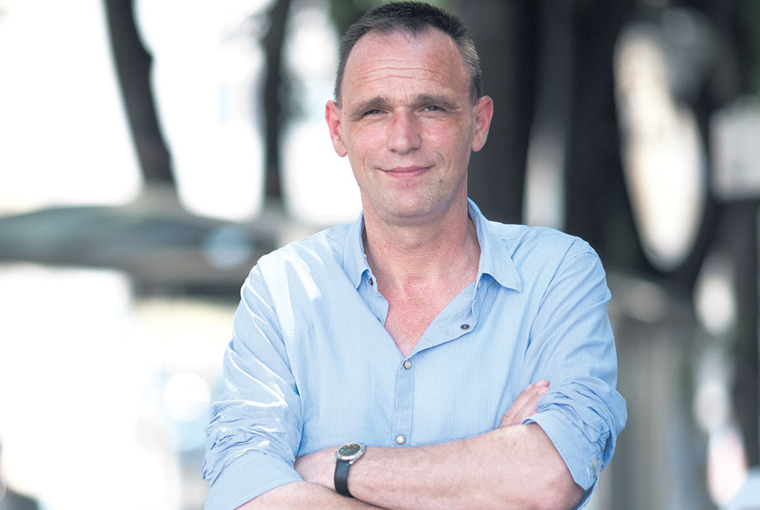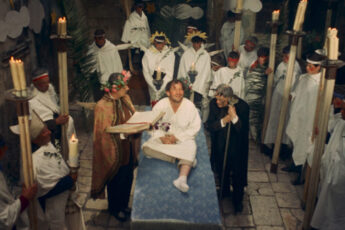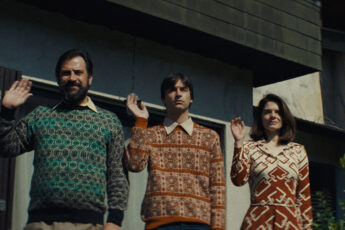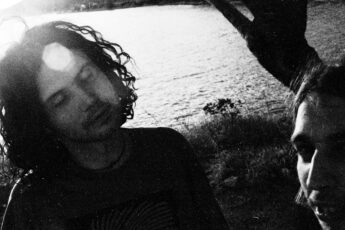
We met Croatian filmmaker Vinko Brešan at the Thessaloniki International Film Festival (October 31-November 10), where he presented his political comedy “What a Country!”. Brešan speaks about the film’s provocative premise, its inception, and its political implications.
How did you manage to get Poland interested in your Croatian-themed film – both television and the national film institute -, and how did you manage to get the legendary Daniel Olbrychski to play in it?
I don’t know how that happened exactly. My producer had sent the script to a Polish producer he knew; the Polish producer liked the script, and applied with it to the Polish Film Institute and Polish TV. Polish television gave us a really fast reply, in 20 days, saying they would be happy to finance it on one condition: one of the main characters would have to be played by a Polish actor. At that point in time I had almost completed the cast. Only one role was still available: the role of the president of Croatia. I had a problem with that role. The president had to have some charisma – in real life it’s not necessary, but in a film, one sort of expects it – and I couldn’t find anybody. So I told Polish TV I had the president’s part open, and that suited them. They offered me Daniel Olbrychski, which suited me perfectly because he looks like old president Tito, he’s definitely a great actor, and he’s also charismatic on top of all that. And I loved working with him.
Since your film is about politics, did you ever think about Croatia and Poland as being in a similar political predicament, and did this matter to you at all?
Hard to say. All co-productions are involved in politics to some extent. There’s simply no running away from that. If the situation is similar in the two countries, good for me! But I will not comment on Polish politics, as that’s a different story. All I can say is that I couldn’t have made the film without the Polish Film Institute.
Let’s talk a little about humor in your film. During the Q&A [at Thessaloniki IFF] you said you don’t think of your film as a comedy. Why is that?
It’s very hard for me to think of it as a comedy. When making this film, I mainly tried to express my point of view on the matter; and my point of view can be summed up in one word: sadness. Of course, I’m a Mediterranean guy. I can’t live without humor. Humor is my way of thinking. In my hometown, humor is a competitive category, a way of communication. That’s why my film is the way it is. If someone thinks of it as a comedy, I will not condemn them. However, my first impulse to write came from sadness and disappointment.
How do you relate to the black humor tradition of the previous generation of Yugoslav filmmakers who made such works as Slobodan Šijan’s Marathon Family, but also to a film like Srđan Dragojević’s Parada? Do you consider yourself influenced by them?
I’m no film critic and cannot make comparative assessments, but I would say that is definitely the case. Slobodan Šijan had a great influence on me and my generation. When I say “my generation” I also refer to Srđan Dragojević, who made Parada, but also to other directors who are now between 50 and 60 years old. These directors come from the same school, the school of Slobodan Šijan. And in that sense, yes, you are right.
You said that your first impulse when writing the script came from sadness and disappointment. What were the sources of inspiration?
The scriptwriter, Mate Matišić, is my best friend. We basically wanted to make a film about Croatia today. We thought about it, and asked what are taboos in Croatian society? And we found three things. Firstly, the suicides of war veterans; secondly, the corruption of high-level politicians; and thirdly, the influence of dead Franjo Tuđman. And that is the reason why we wrote three stories: one about the general who wants to commit suicide, one about the minister who locks himself in a cell and doesn’t want to get out, and one about four guys who steal the coffin of Franjo Tuđman. That’s the source of inspiration and our point of view on Croatian traumas.
You mentioned the influence of dead Tuđman. What does this consist of? Who feels this influence?
It’s very easy. Everybody! Every political agent in the country, the right, the left, everyone! They use phrases like “As Franjo Tuđman used to say,” or “As Franjo Tuđman did…” etc. Everybody quotes Franjo Tuđman. We even have an airport named Franjo Tuđman! And this name was given by a left-wing government. That’s where I see his influence!
Speaking of the left, can you feel its presence in Croatia today?
Good question. In the year 2000, ten years after Croatia came into being, the left came into power. And we celebrated! Before that happened, in 1996 and 1999, respectively, I made two comedies: How the War Started on my Island and Marshal. I made these films because before the left rose to power in Croatia, I felt like laughing. A year after that happened, however, I was so disappointed I wanted to make a tragedy. Nothing was funny anymore. And I made Witnesses, a film about war crimes, which is my only film that isn’t a comedy.
Let us return to your comedy, then! In What a Country! you draw on the past a lot. You have the body of dead Tuđman cross paths with the dead body of another infamous figure of the Yugoslav Wars, Slobodan Milošević, which I personally consider a brilliant plot point. So what is the connection to Yugoslavia, to Tito? The grave digger who ironically gets buried in his own grave, so to speak, also brings up Tito and Tito’s pioneers a few times, and you make a few remarks about this period in the film. In view of the fact that Yugoslavia seems to also be buried in its own crypt, so to say, what is your relationship to the past?
We all live with one foot in the grave of strong political figures of the past. Marshal, my earlier film, was about having one foot in Tito’s grave. This film is about living with one foot in Tuđman’s grave. That gravedigger you mentioned belongs to the working class, and he can’t get out of the grave, just as the working class itself can’t get out of its grave either. It’s not so easy to tell you what my connection with Yugoslavia is, and I have even less of a connection with Serbia now. I put the coffin of Milošević in the film because I wanted to say that we are in the same position, Serbia and Croatia. Someone asked me at the Q&A why I did not put Alija Izetbegović [of Bosnia and Herzegovina] in, too. Well, it’s not for political, but dramaturgical reasons: I can’t put three coffins in the same frame. It would be madness. As for Yugoslavia, it’s very hard to talk about it now, 30 years later. You have people who are 40 years old who already don’t remember Yugoslavia.
Still, you mentioned that the film was screened in Serbia. You must have an opinion about Serbia and the atmosphere there now. There’s a lot of Yugo-nostalgia present in Serbia today, for example, which influences the left and the relationship between the left and the right there. Would you say the same about Croatia?
I am not familiar with the situation in Serbia at all. It’s hard to say. Talking about Tito today generates immediate quarrelling between people. Nobody can see Tito as a historical figure. He’s either a criminal, or a savior. At this particular moment in history, we, people in Croatia, I mean, are not able to talk about him in a different way. And that’s a problem. In actuality, many people attack Tito for the good things he has done, not because of the bad ones. For instance, they attack him because he was against fascism; they attack him for I don’t know what. And still, I don’t think this is the main problem in Croatia at the moment.
You conclude the film with the idea of abolishing the state of Croatia. Do you completely agree with that statement, and what is the future of the state?
Of course I agree with it completely. It’s my statement! In 1995 I made my film How the War Started on my Island. It was the end of the war. At the end of the war everybody had a good feeling about things because they were alive. At that moment we all thought that we can turn Croatia into a nice place. Today people are disappointed because that never happened. All parts of society are disappointed: professors, students, the cultural sphere, the left, the right, everybody! Everybody expected that Croatia would become something else. And now you have a state with most of the population being disappointed. This is what my film is about. You ask me about the future. What can I say about the future of a country whose entire population is disappointed?
What would have been the alternative?
Never ask “What if?” questions. I couldn’t tell you what will happen in the future, either. I can only talk about the spirit of the people now, today. And perhaps about the past.




Leave a Comment